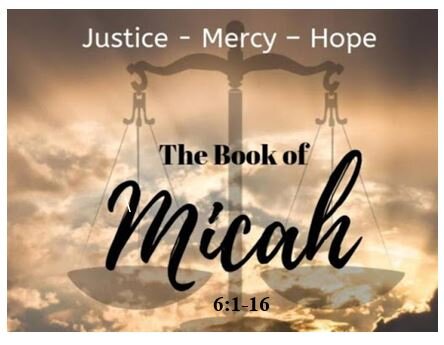BIG IDEA:
WHO IS A GOD TO BE FEARED LIKE YOU – RIGHTEOUS IN JUDGMENT?
THE LORD BRINGS INDICTMENT AGAINST HIS PEOPLE FOR UNJUSTIFIED PERSISTENCE IN WICKEDNESS AND EXPLOITATION AND VIOLENCE
INTRODUCTION:
I. (:1-5) ISRAEL’S OFFENSE IS PARTICULARLY EGREGIOUS IN LIGHT OF THE LORD’S LOYAL LOVE
Definition of egregious: “conspicuously bad”
A. (:1a) Call to Attention
“Hear now what the Lord is saying”
Phrase marks out significant divisions in the book
B. (:1b) Offer Your Defense
“Arise, plead your case before the mountains,
And let the hills hear your voice.”
All of nature is presented as the listening jury
Ryrie: The mountains and hills were present at Sinai when the Lord made His covenant with Israel and when the commandments were written and placed in the ark of the covenant as a permanent witness (cf. Dt. 31:26).
C. (:2) Court Room Antagonists – The Lord Bringing Indictment Against Israel
“Listen, you mountains, to the indictment of the Lord,
And you enduring foundations of the earth,
Because the Lord has a case against His people;
Even with Israel He will dispute.”
D. (:3) No Excuse of Provocation
“My people, what have I done to you,
And how have I wearied you? Answer Me.”
E. (:4-5) Demonstration of Loyal Love
1. (:4a) In Redeeming His People from Egypt
“Indeed, I brought you up from the land of Egypt
And I ransomed you from the house of slavery”
2. (:4b) In Providing Faithful Leaders
“And I sent before you Moses, Aaron and Miriam.”
3. (:5a) In Consistently Blessing His People
“My people, remember now what Balak king of Moab counseled
And what Balaam son of Beor answered him”
4. (:5b) In Bringing Them Into the Promised Land
“And from Shittim to Gilgal”
Ryrie: Shttim being the last encampment E of the Jordan River and Gilgal the first on the W bank.
5. (:5c) Summary: In All His Righteous Deeds
“In order that you might know the righteous acts of the Lord.”
II. (:6-8) RELIGIOUS RITUAL AND EMPTY SACRIFICE CANNOT COMPENSATE FOR FAILURE TO OBSERVE GOD’S CLEAR REQUIREMENTS
A. (:6-7) Ritual and Sacrifice Cannot Atone for Sin
“With what shall I come to the Lord And bow myself before the God on high?
Shall I come to Him with burnt offerings, With yearling calves?
Shall I present my firstborn for my rebellious acts,
The fruit of my body for the sin of my soul?”
B. (:8) God’s Clear Requirements
1. Not Hidden but Revealed
“He has told you, O man, what is good;”
2. Not Complicated but Straightforward
“And what does the Lord require of you”
a. Justice in Defending the Helpless (vs. Exploitation)
“But to do justice”
b. Kindness in Word and Deed (vs. Meanness)
“to love kindness”
Finley: the true worshiper of the Lord will love to demonstrate kindness and forgiveness to other human beings. As one who has himself drunk deeply of God’s mercy, he will want to share that mercy with all who are around.
c. Humility in Serving God (vs. Pride)
“And to walk humbly with your God.”
III. (:9-16) THE LORD’S INDICTMENT SPELLS OUT THE SPECIFIC CRIMES AND CORRESPONDING PUNISHMENTS
A. (:9) Authoritative Voice of the Supreme and Sovereign Judge
“The voice of the Lord will call to the city –
And it is sound wisdom to fear Your name:
‘Hear, O tribe. Who has appointed its time?’”
B. (:10-12) Specific Crimes
1. (:10-11) Wickedness Demonstrated in Cheating and Defrauding
“Is there yet a man in the wicked house,
Along with treasures of wickedness
And a short measure that is cursed?
Can I justify wicked scales
And a bag of deceptive weights?”
2. (:12) Wickedness Demonstrated in Violence and Deceit
“For the rich men of the city are full of violence,
Her residents speak lies,
And their tongue is deceitful in their mouth.”
C. (:13-15) Corresponding Punishments
1. (:13) Physical Suffering
“So also I will make you sick, striking you down,
Desolating you because of your sins.”
2. (:14a) Frustration and Emptiness
“You will eat, but you will not be satisfied,
And your vileness will be in your midst.”
3. (:14b) Plundering of Inheritance
“You will try to remove for safekeeping,
But you will not preserve anything,
And what you do preserve I will give to the sword.”
4. (:15) Suspension of Harvest Law
“You will sow but you will not reap.
You will tread the olive but will not anoint yourself with oil;
And the grapes, but you will not drink wine.”
D. (:16) Apostate Society
1. (:16a) Sinful Practices
“The statutes of Omri
And all the works of the house of Ahab are observed;
And in their devices you walk.”
Example of wicked kings of Israel who led their people astray
Ryrie: Omri (Ca. 885-874 B.C.) He was the founder of Samaria and of Ahab’s wicked house as well as a supporter of Jeroboam’s superstitions (cf. 1 Ki 16:16-28).
2. (:16b) Shameful Judgment
“Therefore I will give you up for destruction
And your inhabitants for derision,
And you will bear the reproach of My people.”
Ryrie: The people had degenerated to the low level that characterized the days of Omri and Ahab, a period that had become a byword for apostasy (cf. 1 Kings 16-22).
MacArthur: The Lord was sending judgment; God Himself had appointed the time and instrument to punish His people. The Lord spoke, noting that their corrupt deeds perpetrated on the poor were still continuing, in spite of His warnings and discipline (vv. 10-12). Therefore, a severe judgment was coming (vv. 13-15); it would happen to them just as it did to their northern neighbor, Israel (v. 16) when led by the counsel of wicked kings.

